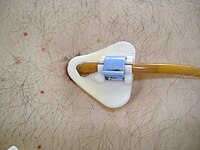
Photo from wikipedia
Objective To explore the effect of feedforward control on reducing the incidence of unplanned extubation and improving the quality of catheter nursing. Methods A total of 186 patients with nasogastric… Click to show full abstract
Objective To explore the effect of feedforward control on reducing the incidence of unplanned extubation and improving the quality of catheter nursing. Methods A total of 186 patients with nasogastric tube after gastrointestinal surgery in the eastern region of our hospital from September 2020 to September 2021 were selected as the control group; 186 patients with nasogastric tube after gastrointestinal surgery in the western region of our hospital at the same period were selected as the experimental group. The influencing factors of unplanned extubation in patients with long-term postoperative nasogastric tube were analyzed, and effective preoperative and postoperative health education was conducted. The ratio of unplanned extubation of nasogastric tube and nursing satisfaction of patients in the two groups were compared. Results Patient constraint, perceived pressure score, anxiety score, nasal gastrointestinal canal health education feedback score and indwell tube comfort score were independent risk factors for unplanned extubation. The restraint rate and the incidence of unplanned extubation in the experimental group were lower than those in the control group after intervention, with statistical significance (P < 0.05). The nursing satisfaction of the experimental group was significantly higher than that of the control group after feedforward cognitive intervention. After intervention, serum albumin and gastric PH in the experimental group were significantly higher than those in the control group (P < 0.05). Conclusion The safe nursing management method of feed forward control can effectively reduce the incidence of unplanned extubation in inpatients, which is worth further promoting in nursing work.
Journal Title: Journal of Multidisciplinary Healthcare
Year Published: 2023
Link to full text (if available)
Share on Social Media: Sign Up to like & get
recommendations!